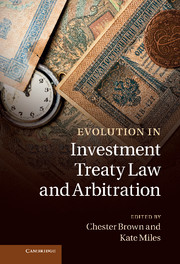Book contents
- Frontmatter
- Contents
- Contributors
- Editors' preface and acknowledgements
- Table of cases
- Table of Treaties
- Part I Introduction
- Part II Shifts in fundamental character
- Part III Actors in international investment law
- 8 Sovereign wealth funds and international investment law
- 9 Investor misconduct: Jurisdiction, admissibility or merits?
- 10 The European Union as a global investment partner: Law, policy and rhetoric in the attainment of development assistance and market liberalisation?
- 11 The ‘fair and equitable treatment’ standard and the circumstances of the host State
- 12 The plea of necessity under customary international law: A critical review in light of the Argentine cases
- 13 Making way for the public interest in international investment agreements
- 14 The participation of sub-national government units as amici curiae in international investment disputes
- Part IV The new significance of procedure
- Part V Engagement with cross-cutting issues
- Part VI Conclusions
- Index
- References
9 - Investor misconduct: Jurisdiction, admissibility or merits?
from Part III - Actors in international investment law
Published online by Cambridge University Press: 05 December 2011
- Frontmatter
- Contents
- Contributors
- Editors' preface and acknowledgements
- Table of cases
- Table of Treaties
- Part I Introduction
- Part II Shifts in fundamental character
- Part III Actors in international investment law
- 8 Sovereign wealth funds and international investment law
- 9 Investor misconduct: Jurisdiction, admissibility or merits?
- 10 The European Union as a global investment partner: Law, policy and rhetoric in the attainment of development assistance and market liberalisation?
- 11 The ‘fair and equitable treatment’ standard and the circumstances of the host State
- 12 The plea of necessity under customary international law: A critical review in light of the Argentine cases
- 13 Making way for the public interest in international investment agreements
- 14 The participation of sub-national government units as amici curiae in international investment disputes
- Part IV The new significance of procedure
- Part V Engagement with cross-cutting issues
- Part VI Conclusions
- Index
- References
Summary
Introduction
In Quantum of Solace, the latest film in the James Bond series, the ruthless Dominic Greene, frontman for the evil international organisation, Quantum, forges a deal with exiled Bolivian General Medrano. In return for some large briefcases of euros and the new title of president, Medrano signs over a vast tract of desert, which, unbeknownst to him, contains most of his country's fresh water. Having acquired rights to the country's water, Greene then forces Medrano to provide his organisation an exclusive concession for provision of water services, under threat of forceful removal. The fictional events in Quantum of Solace play on a popular theme in contemporary film – that of the nefarious multinational corporation acquiring rights to natural resources in a poor, developing State through illegitimate means, often with the connivance of a rich, developed State.
In Ian Fleming's original story by the same name, the term ‘quantum of solace’ refers to the common humanity required between two people for a relationship to survive. As James Bond says in the story: ‘When the other person not only makes you feel insecure but actually seems to want to destroy you, it's obviously the end. The Quantum of Solace stands at zero. You've got to get away to save yourself.’ This view is likely shared at times by both States and foreign investors when the conduct of either party erodes the trust and confidence between them that is necessary for a successful and mutually beneficial foreign investment relationship.
- Type
- Chapter
- Information
- Evolution in Investment Treaty Law and Arbitration , pp. 187 - 200Publisher: Cambridge University PressPrint publication year: 2011
References
- 6
- Cited by



